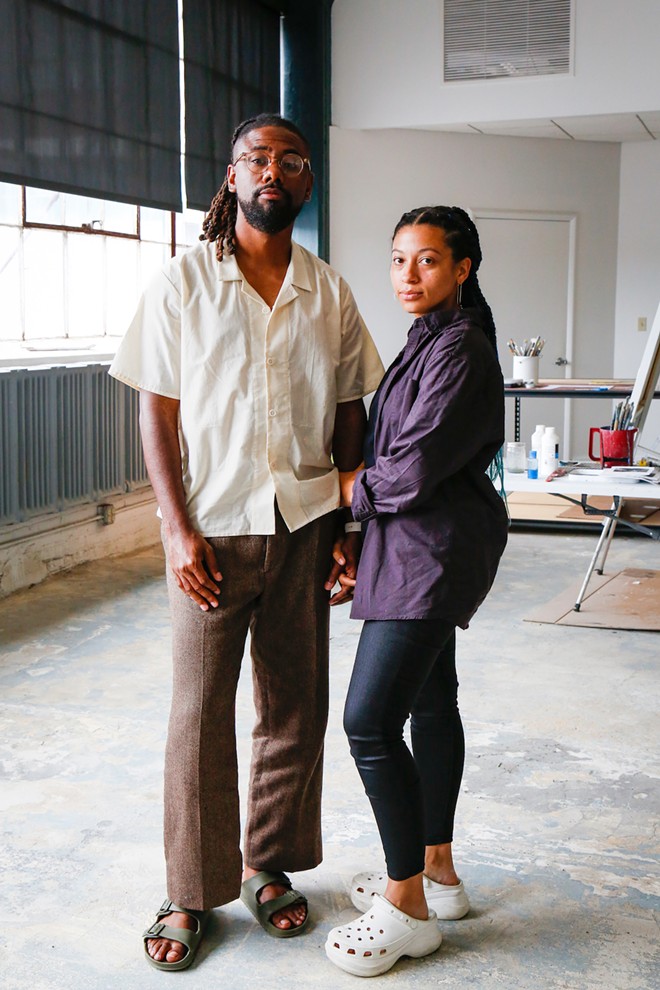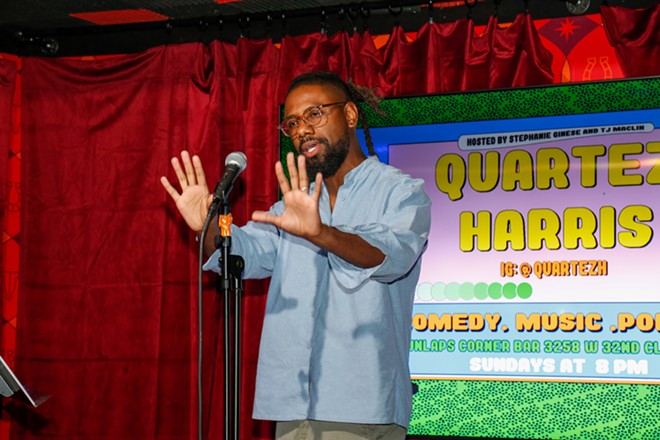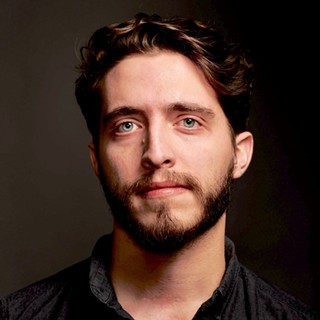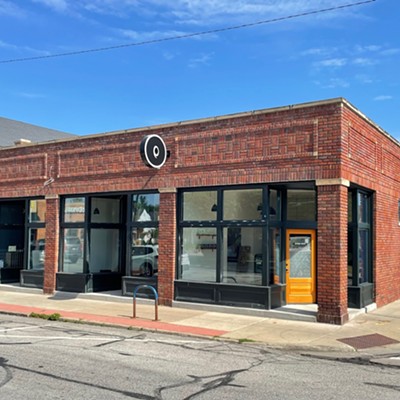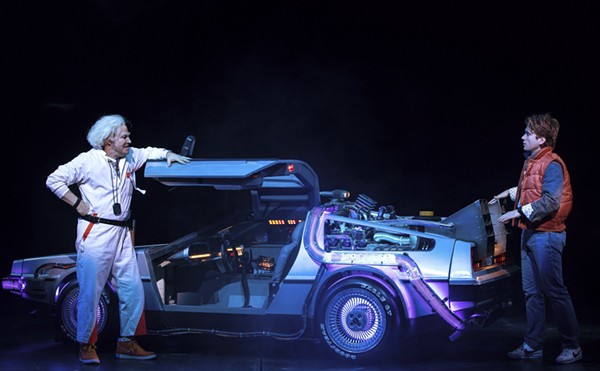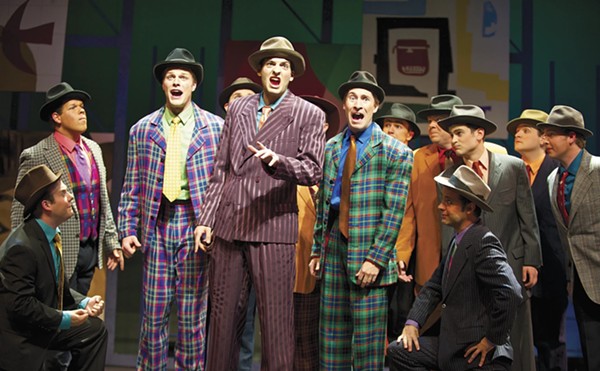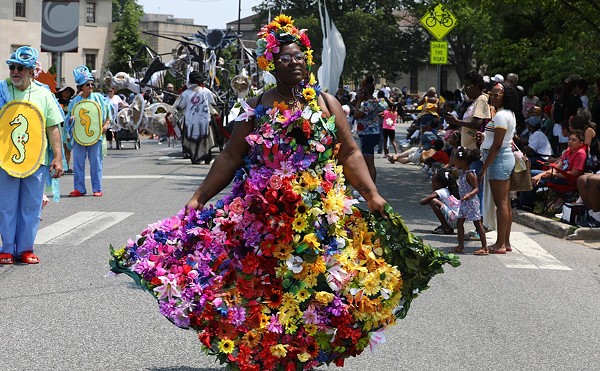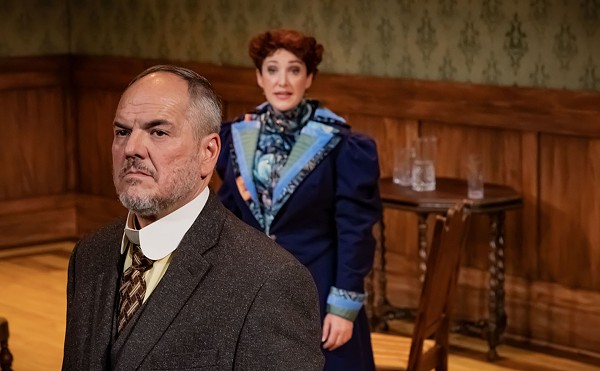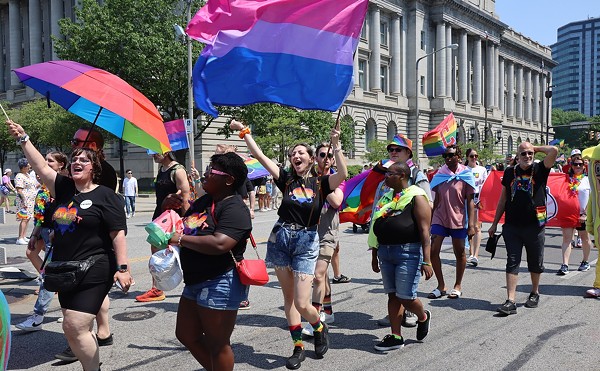There are few pairings that, from afar, drip with more romance than those between two writers.
Some, like that between F. Scott and Zelda Fitzgerald, are remembered as much for envy and bickering as the symbiotic creative force of their relationship. Some, like the marriage of Jonathan Safran Foer and Nicole Krauss, end with jealousy and affairs. Others, of course, flourish. When asked by a journalist whether her husband, the great Italian novelist Alberto Moravia, afflicted her own work, Elsa Morante disagreed. “No,” she told the reporter. “He has an identity. I have an identity. Basta.”
In Cleveland, we have Quartez Harris and Kortney Morrow. Both published, award-winning poets who grew up in Ohio, the couple share a unique affinity for both the poetry of self and the poetry of the other. It’s a relationship on the precipice of evolution: After two years of dating, Harris and Morrow are to be married in Tremont this July, in a small ceremony surrounded by family, friends and fellow writers.
A wedding buttressed by two career leaps: Morrow, after eight years of publishing in literary presses, will come out this year with a picture book on different cultures’ interpretations of rainbows. And big news for Harris: With a $375,000 contract, Little Brown will soon publish three books—including a kid-friendly biography of James Baldwin.
Such a six-figure deal has quickly lifted Harris up to the big league stratosphere. He has two books under his belt already since 2014—one an homage to his second-graders at Stonebrook-White Montessori in Glenville— yet Harris has very little national recognition. Four years ago, he’d dreamt up a picture book on Baldwin, an idol of his, and sent a draft to a literary agent in New York, Tanya McMillon, based off a friend’s referral.
To Harris’ surprise, McMillon called back with praise. He recalls the conversation easily. “I think that was the first time I ever cried in front of my son,” Harris recounted last August, from a writing studio he shares with Morrow in Lakewood. In a cream button-down, tied dreads and round Windsor glasses, Harris exudes equal measures of erudition and total chill. “I was just like—Yo! The fact that big publishers are expressing interest. From then on, it was a whirlwind, man.”
That whirlwind led to a silent ripple in Cleveland’s literary scene. Harris’ We Made it to School Alive, that collection poeticizing the gun-fearing anxiety that haunts Black kids in low-income schools, led to Harris being crowned Ohio Poetry Association’s Poet of the Year in 2021, the year after it published. Local media viewed it as a Covid-era document of a distraught school system. Writer Hanif Abdurraqib called School Alive “a brilliant force for the uplift of young Black folks, and the people who love them.”
But still, Harris felt blessings to count when Little Brown gave him the green light. To put it into context, the average advance for a young adult book is about $35,000. ($57,000 for your typical author.) Fewer than one percent of writers receive advances over $250,000, according to Publishers Marketplace. Only 233 of such deals were signed out in 2022 alone.
“It’s absolutely stunning,” Matt Weinkam, the director of Literary Cleveland, told Scene. “For a first-time author to get a multi-book deal of this size is almost unheard of these days. And for his only previous publications to be poetry is even more unusual.” Weinkam laughed. “It’s become something of a minor sensation in our corner of the world.”
Born in Springfield, Ohio, in 1990, Harris grew up far outside any literary context. His dad, James, worked on cars at a nearby Honda plant, and his mom, Tanishawe, was a janitor for a military base. If anything, books were anathema to Harris. For most of his schooling, he struggled with a learning disability that made decoding or vocalizing words an endless obstacle. He was teased often. Up until high school, he was assigned to an IEP classroom with three or four other like students. Or, as Harris qualifies it: “A chaotic journey.”
A journey he’d elucidate in “Imperfect Brain,” one of Harris’ first poems that contextualized the link between his disability and writing. “I think I had a sensitivity to language,” Harris said, “because I was always told that I couldn’t use it. I was told that I wouldn’t be able to harness its utility.”
In 2016, Harris got a job through Teach for America to teach English to second graders at Glenville. He had worked as a social worker in Franklin County for two years after graduating from Ohio State, and grew uneasy with the “turmoil” of the disenfranchised. But something sparked at Glenville. He began jotting down notes—things students said, their fears, their joys. It became, in 2020, a concept book that merged biography and documentary.
And one verging on the cynical. Bullets are compared to beetles. Bullets crash Xboxes. Cops dig up dirt for children’s graves. “Send Them Their Condolences While They’re Alive,” one poem is entitled. “is it wrong / that my grandma / still has the clothes,” another goes goes, “my uncle / was shot in?”
Regardless, it wowed the right people. Tanya McKinnon, who read School Alive in 2022, found that it introduced Harris as a writer who both knows what it's like to have a child’s heart and have a heart for children. “He has a special voice,” she told Scene. “He knows what it’s like to be a kid who faces a challenge and overcomes it. Frankly, he’s a wonderful role model.”
It’s what, McKinnon believes, sold Little Brown on Go Tell It, Harris’ own exploration of James Baldwin’s struggles stemming back to his childhood in Harlem. Then, as a Parisian expat sick of American racism. Then, as a leading intellectual of the Civil Rights Movement.
“He’s just this sort of person who defied every odd stacked against him,” Harris said. “He wasn’t, like, a college candidate. But yet Baldwin became a literary individual who is certainly marveled at.” Harris’ mind shifted back to his former students, and, presumably, his own childhood. “He came from that same environment.”
"As a kid, I used to imagine myself split into two halves, never whole, grappling with what it meant to be half-Black and half-white. When a boundary was crossed with my body at a young age, I imagined all the sensual energy in me splintered off into a foreign object, floating through the ether, traveling away from me indefinitely. After trying to hard to reclaim what I thought I’d lost, I feared the distance too great."
Growing up near Shaker Square, as, Morrow writes in the same piece, “a super shy kid with anxiety brewing under my chewed up fingernails,” Morrow moved to Chicago to study media and communications, intrigued with language’s ability to lift the self. She took that mentality to New Orleans, in November 2016, where she helped set up the city’s first branch of Dave Egger’s 826 National, a tutoring center. Two years later, itching to be aunt to her brother’s new child, she relocated to Toronto.
In 2019, brimming with a loose collection of poetry, Morrow applied to graduate school. She heard back from New York University and Ohio State, so, feeling the family route, Morrow chose her home state. In 2020, with the pandemic beginning, she returned to Cleveland to finish her masters, and try and finish her collection. “It was a really challenging time for me, both as a person and as a writer,” she said, from her writing desk. “It was the right time to come home.”
Morrow echoes this in “Colorway Crown,” an eight-page crown sonnet about LeBron James’ own path to homecoming. In it, she empathizes with James as person and myth, seeing his free agent status as a gift and crutch. She spent “most of” 2022 perfecting it. “Some people say when you leave, / don’t look back,” Morrow writes. “Others say, take the whole team / with you. I chose the former, ghosting / my past, its people.”
In the winter of 2022, around the same time “Colorway” was written, Morrow received a message from Harris. She was just familiarizing herself with Cleveland’s literary scene and had used Literary Cleveland as a starting hub. She found School Alive. She looked up its writer. She followed Harris on Instagram.
“Well, she was following me, and I followed her back, of course,” Harris said. He had looked up “Mariah Carey” and was enthralled. “I was like, ‘Who’s this poet?’ She’s from Ohio. I have some sort of tie, some depth in this literary culture here—I should know her! I didn’t know her.” Harris reached out to network. He asked her for coffee at Van Aken. “I didn’t have any romantic impulses.”
It went well. Harris called up Morrow on the regular after. That blossomed into Harris, two weeks later, asking Morrow out to dinner at Adega. “I don’t really do fancy restaurants,” Morrow said. The two ate and talked books for hours. They found a mutual understanding of the approach to the writing process. Harris confirmed this when, arriving back at Morrow’s apartment for the first time, he saw a copy of his School Alive on her shelf.
“It’s been very magical,” Harris recalled. “We both have an equal commitment to the rigor of writing, but also the playfulness of writing. So, it’s been very playful.”
Morrow had her own realization, or at least confirmation, soon after Harris divulged details about the Little Brown deal. “I remember thinking, ‘Is he telling me this to impress me? Why is he sharing this with me?’” she said, looking over across the studio at Harris, smiling warmly. “His excitement is contagious. And also, I kind of felt, I guess, this sense that I want to protect him.” On February 11, 2023, a year after they began dating, Harris and Morrow got engaged, on vacation in a treehouse in Atlanta.
In early April, shortly after Harris turned 34, Harris and Morrow meet at Dunlap’s in Clark-Fulton for a variety show called Con Tú, for which Harris has been asked to read.
“Here he is, 2021 Ohio Poet of the Year!” T.J. Maclin, better known as Peachcurls, said manning a deejay booth.
“He comin outta Cleveland,” poet Stephanie Ginese said from the mic. “I don’t want to make this about us, but it’s a wonderful thing when writers make their way up into the big leagues,” Maclin said, citing the Little Brown deal. “Upp inn the bigg leagggues,” he sang.
Harris read “I Feel You,” sprawling poem from School Alive, then a short story about his son Levi’s critique of his father’s fashion, how the two see Harris’ floods differently. “We feel it’s unsafe to be ourselves when we stare out at other people far too long,” Harris read, “imagining what they think when they see us dancing.”
After a long applause break, Harris walked back to a tall table where Morrow sat watching, in a powder blue coat with her hands on her chin. Both their eyes light up with a strong jolt of reunion.
A slow jam came on the speakers. Harris took Morrow’s hand to dance. “Awww,” a woman said at a nearby table.
“I love you,” Morrow mouthed.
“I love you,” Harris said.
What about writing is a lonely act? Hemingway, after all, said the writer is doomed to a life of isolation, even amidst the pretty guise of celebrity. Writing, especially poetry, is both a reconciliation with the spirit and an inner desire to be heard by a tuned-in audience. If writing is prayer, as Kafka once said, then it's a prayer to the unknowable. A poet rarely writes with a face in her mind’s eye.
It’s a subject that Harris and Morrow were invited to speak about at a recent writing workshop hosted by Lake Erie Ink, a local affiliate of 826 National. From a panel in the dimly lit quarters of the Werner Mansion off Euclid Avenue, Harris, Morrow and a panel of local authors with credibility spoke to mostly teenagers about the never-ending vagaries of battle with the page. It’s Harris’ take that is, safe to say, the most notable: Writing is a self-actualization exercise, a way to puncture through the stigma of a childhood misconstrued. “I’m not a self-confident writer,” Harris told the attendees. Morrow sat still on the opposite end of the panel. “It’s always, always been a point of struggle for me.”
At one point, after the panel divides up to spearhead group workshops, Harris turned to an association exercise. “Who are you?” he asked a high school girl. A rainbow, she said. Harris turned to Morrow, who was halfway through a slice of pizza. “Who are you?” he said.
“A floating cloud with the sunset below,” Morrow said.
“Oooooooh,” Harris said.
“…with spice,” she added.
“Ahhhhhh,” Harris said. “That’s true.” He turned to the class to kickstart the writing portion. “Now,” he said, “we’re gonna spend five minutes with who you really are.”
In the first week of May, shortly after Harris announced Go Tell It’s publishing date (Spring 2025) and Morrow wrapped up her work on Rainbow Atlas, the two gathered in their cozy, white-walled studio space in the Screw Factory in Lakewood. Things had changed in the past year. The couple had garnered more space. They bought more furniture. They erected two tall, beige shelves to display books, mostly from Ohio writers. “Actually, I’m near the end of the process to hire my first booking agent,” Harris said, walking through the building. He preempted the obvious implications of Little Brown having something to do with it. “I know, right?”
In the studio, Harris’ 10-year-old son, Levi, doodles with a series of painter’s pens. “He draws like his dad,” Harris said, showing off cartoons Levi had painted earlier that week. Levi left, and the conversation returns naturally to the subjects of work and love. Both, as observers are careful to point out, worthy of at least a healthy amount of jealousy. Key word being healthy. “Love looks through a telescope,” the humorist Josh Billings once wrote. “Envy, through a microscope.”
“I still feel that writing, the writer’s life, still requires a loneliness,” Harris said. “I mean, we’re a literary couple. But we still are attracted to that sense of loneliness. Being in a relationship is a leap. And it’s more than just checking in with the editorial process.”
Morrow looked at Harris, in a look that could tie the spirit. “Yes, it’s good to have a notion of a safety net, and also break that notion,” Morrow said. “But I still see this as a collaborative effort. Like with my writing—who else wants to look at the world this way?”
Harris brings out a blanket metaphor. “We all try to keep each other warm,” he said. “And have a comfortable place to sleep. 'Cause the world is scary.”
Subscribe to Cleveland Scene newsletters.
Follow us: Google News | NewsBreak | Reddit | Instagram | Facebook | Twitter


